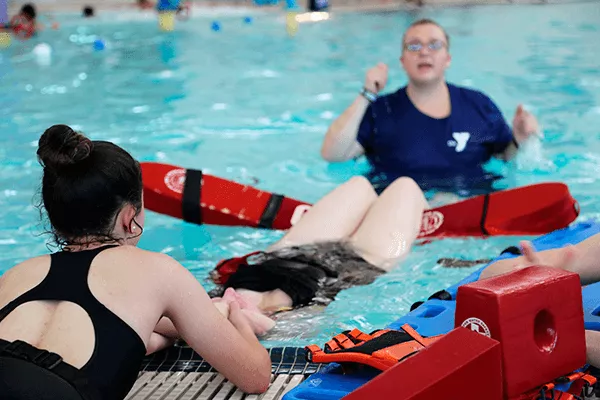sports

May 23,2025 • 4 min read
Lifeguards in Focus: Why Their Role Matters More Than Ever

In today's world, safety at aquatic environments has become more important than ever before. Whether it’s a community pool, a public beach, or a waterpark, the role of lifeguards extends far beyond just scanning the water. Lifeguards are trained professionals whose quick thinking and preparedness save lives, prevent injuries, and create a safe atmosphere for everyone. This article explores the essential role lifeguards play in public safety and why their presence is crucial in modern society.
1. Frontline Responders in Water Emergencies
Lifeguards are the first line of defense in any aquatic emergency. They are trained to recognize distress, perform water rescues, and administer first aid or CPR training if necessary. Their presence drastically reduces the response time in life-threatening situations.
Explanation:
A drowning incident can occur in as little as 20–60 seconds. Lifeguards are trained to detect the subtle signs of distress that others might miss, allowing them to act immediately. Their preparedness ensures that accidents are dealt with quickly, often preventing fatalities.
2. Prevention Through Vigilant Surveillance
Prevention is a critical part of a lifeguard's job. Constant monitoring of swimmers helps identify risky behaviors before they lead to incidents.
Explanation:
Rather than just reacting to emergencies, lifeguards work proactively. By enforcing rules, watching for signs of fatigue, or identifying dangerous play, lifeguards prevent accidents from happening in the first place. This preventive aspect of their role helps maintain a safe environment.
3. Education and Public Awareness
Lifeguards often serve as educators, informing the public about water safety, swimming rules, and environmental hazards such as rip currents or weather changes.
Explanation:
Through clear communication and guidance, lifeguards help reduce the likelihood of accidents. Whether they’re advising on swimming within designated areas or warning about dangerous conditions, their role as communicators is vital for public safety.
4. Support for Families and Children
Children and families rely heavily on lifeguards to provide a secure environment. Parents often feel more at ease knowing trained professionals are watching over the pool or beach.
Explanation:
With many children being inexperienced swimmers, the presence of lifeguards is essential. Their watchful eyes allow families to enjoy recreational activities without constant worry, knowing someone is ready to help if needed.
5. Physical and Mental Readiness
Lifeguards must be in top physical and mental condition to handle the demanding nature of their job. They undergo rigorous training and regular recertification to stay sharp.
Explanation:
This level of preparedness ensures that lifeguards are not only physically capable of performing rescues but also mentally equipped to make fast, critical decisions under pressure. Their ability to remain calm and composed is often the difference between life and death.
6. Vital in Disaster and Crisis Situations
Lifeguards are trained to handle more than just routine rescues. In events such as natural disasters, mass gatherings, or unexpected emergencies, lifeguards step up to manage crowd control, assist with evacuations, and support emergency services.
Explanation:
Their training in emergency response, including CPR, first aid, and basic triage, makes them valuable assets during chaotic situations. Their discipline and experience in high-stress environments ensure public safety remains a priority.
7. Promoters of Health and Safety Culture
Lifeguards help instill a culture of safety and responsibility in aquatic spaces. Their consistent enforcement of rules and standards fosters a respectful, health-conscious environment.
Explanation:
By consistently modeling and encouraging safe behavior, lifeguards influence how people act around water. They help normalize the use of flotation devices, proper diving techniques, and respectful conduct, contributing to a long-term shift in public behavior.
8. Role Models and Leaders in the Community
Lifeguards, especially in community pools and youth programs, often serve as mentors. Their commitment to discipline, teamwork, and service makes them strong role models for young people.
Explanation:
Many children look up to lifeguards, aspiring to one day take on similar roles. Lifeguards can influence a generation to value responsibility, physical fitness, and public service, creating a ripple effect of positive impact.
Conclusion
Lifeguards are more than just people with whistles and sunglasses—they are trained professionals who serve as guardians of public safety in aquatic environments. As the demand for recreational water use increases and environmental risks evolve, their role becomes even more critical.
Their ability to prevent accidents, respond to emergencies, educate the public, and act as role models highlights their multifaceted importance in society. Recognizing and respecting the work of lifeguards is essential—not only for the safety of individuals but for the well-being of entire communities.
Benjamin Details
User Profile
- Full name
- Benjamin
- Email address
- benjaminowenleo@gmail.com
- Join Date
- 2025-05-23
- State
- City
- Pincode
- Address
- Follow us on Facebook
- Follow us on Twitter
- Website Name
- Bio